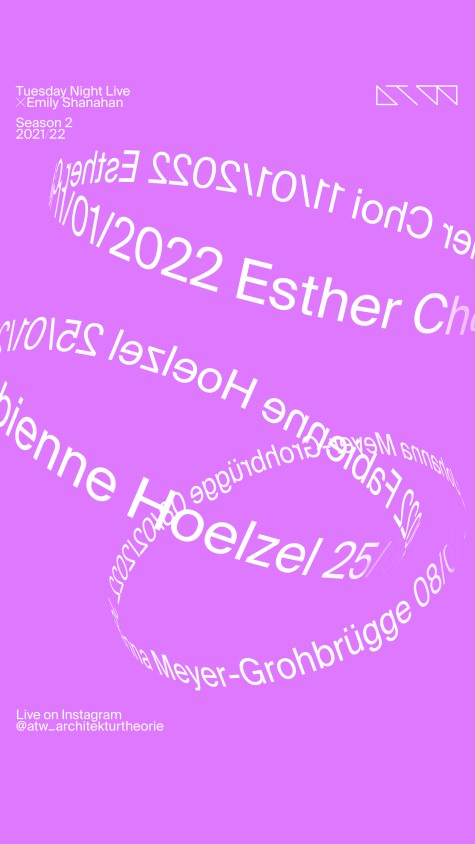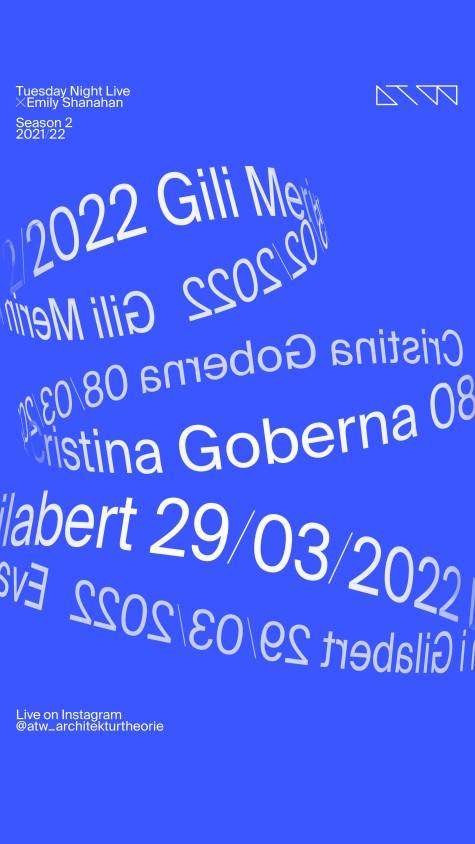Architecture Theory and Science

Tuesday Night Live X Emily Shanahan
»Are there any new Questions anymore?«
Tuesday Night Live is a event series at Technische Universität Darmstadt with international thinkers and architects to share their work in process and discuss with students, teachers and the public. Each »season« of Tuesday Night Live has e a prescription, a set of rules or questions, brought to live and filled with diverse content by the selected guests.
For the second season, New York artist Emily Shanahan has put together a conversation guide: »The questions are adapted from psychological questionnaires, government polls, professional interviews with architects, personality quizzes, and job interview prompts. They follow established patterns of information extraction that seek to identify “types” of persons. Decontextualized and recombined, these questions elicit thinking beyond normative logics. Playing with the conventions of knowledge exchange, they ultimately ask: Are there any new questions anymore?«
Season 2 — 2021/22
Tuesdays, 19:00 CET
08.06.2021 Ines Weizman
22.06.2021 Elis Mendoza Mejia
29.06.2021 Sophie Hochhäusl
11.01.2022 Esther Choi
25.01.2022 Fabienne Hoelzel (will be held in German)
08.02.2022, 10:00 Early Bird Episode Johanna Meyer-Grohbrügge (will be held in German)
15.02.2022 Gili Merin
08.03.2022 Cristina Goberna
26.04.2022 Eva Franch i Gilabert – date canceled!
Live on Instagram @atw_architekturtheorie
#ATWTuesdayNightLive #AreThereAnyNewQuestionsAnymore
Latest episode
Archive
Episode 1
Ines Weizman is Head of the PhD Programme at the School of Architecture, Royal College of Art, London. She is also the founding director of the Centre for Documentary Architecture (CDA), an interdisciplinary research collective of architectural historians, filmmakers and digital technologists. Ines Weizman was the editor of “Dust & Data: Traces of the Bauhaus across 100 Years” (Spector Books, 2019) and “Architecture and the Paradox of Dissidence” (Routledge, 2014). She has also worked on exhibitions and installations such as “Repeat Yourself: Loos, Law, and the Culture of the Copy”, exhibited at the 2012 Venice Architecture Biennale, as well as in Vienna and New York. Other research and exhibition projects include “Celltexts: Books and Other Works Produced in Prison” (2008, with Eyal Weizman). In 2019 together with the CDA she curated the exhibition “The Matter of Data”, which was shown in Weimar, Tel Aviv and Berlin.
Episode 2
Elis Mendoza is an architect and researcher based in New York City/Mexico City. She is a PhD candidate in Architecture History and Theory by Princeton University. Elis works in the intersection between built space, memory, and human rights with a special focus in post-conflict cities. Her research traces histories of architecture expertise within the incipient humanitarian government of the 1970s parallel to the more common architectural histories of development and technology. Her work has received support from the Paul Mellon Centre, the Program for Latin American Studies at Princeton, the Open Society, the Mexican National Council for Science and Technology (CONACYT), and UN Women.
Elis’ second line of work uses applies her experience as a researcher of human rights history and her training in forensic architecture to work closely with communities at the center of human rights violations to create new legal narratives around events that visibilize systemic oppression and government neglect. She has worked in Mexico and Guatemala as a forensic architecture expert and presented her work at the Guatemalan Supreme Court in the Sepur Zarco trial in 2016.
Her work has been published at Avery Review, Art Papers, The Funambulist and Dc Papers among others.
Episode 3
Sophie Hochhäusl is an Assistant Professor for Architectural History and Theory at the Stuart Weitzman School of Design and a member of the Executive Board for the program in Gender, Sexuality, and Women’s Studies. In the 2021-2022 academic year she is also an Alexander von Humboldt Research Fellow at the TU Darmstadt and the Munich Center for the Documentation of the History of National Socialism. In her work, Professor Hochhäusl is interested in modern architecture and urban culture with a focus on spatial histories of dissidence and resistance studies, queer theory and gender studies, as well as labor theory.
Episode 4
Esther Choi is a Korean-Canadian multidisciplinary artist and architectural historian interested in the technologized natural world. Her artwork, writing, and scholarship investigate how concepts of nature, identity, and notions of the human have shaped and been shaped by worldmaking practices.She is also interested in the intersections between representation and dialogical aesthetics. Recent works include „Le Corbuffet“, an artist's book that adopts the form of a cookbook; and „Office Hours“, a socially-engaged initiative that cultivates the sharing of worldmaking knowledge amongst practitioners who identify as Black, Indigenous, and People of Color. Her essays have been published in Artforum, Architectural Review, E-Flux Architecture, Art Papers, and SSENSE.
Episode 6
Johanna Meyer-Grohbrügge is an architect and professor at the TU Darmstadt for architecture and spatial design. After graduating from the ETH Zürich she worked for SANAA in Tokyo for 5 years before setting up her office June14 Meyer- Grohbrügge & Chermayeff in 2010 and MEYER-GROHBRUEGGE in 2015, both based in Berlin. Johanna has taught at several institutions, such as the Columbia GSAPP, the Northeastern University Boston, the Washington University St. Louis and the DIA Dessau. Her offices and teachings are concerned with finding spatial solutions to the challenges of our time.
Episode 7
Gili Merin is an architect and photographer based in London, Vienna and Tel Aviv. She is the interim head of History and Theory of architecture at the Royal College of Arts and was previously a Diploma unit master at the AA. Her doctoral dissertation 'Towards Jerusalem: The Architecture of Pilgrimage' (supervised by Pier Vittorio Aureli and Maria S. Giudici) explores structures of spiritual travel using photography as a design tool.
Episode 8
Cristina Goberna is a New York and Barcelona – based architect, critic, educator and founder of Architectural Agonism, Epic Architecture and The Destitute Institute. Her work explores through buildings, text, photography, and pedagogy the potential of Agonism to unveil issues often overlooked by the architectural field. She is a PhD candidate at the European Graduate School in Switzerland in the Department of Philosophy, Art and Critical Thought and in the ETSAB in Barcelona where she writes a dissertation about the Architecture of Desire. After teaching at Columbia GSAPP, Sydney UTS, the MIT, Cooper Union and the Royal College of Art, she is currently a professor at BAU, Escola de Diseny, Barcelona and an Associate Professor of Practice at Illinois University.
Tuesday Night Live is a event series by the chair of Architecture Theory and Science at the faculty of Architecture (@fb15architektur) at Technical University of Darmstadt, supported by the Sto-Stiftung (@stostiftung). Design by Moritz Ebeling





